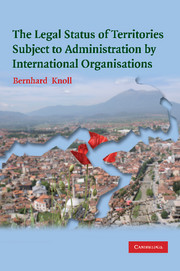Book contents
- Frontmatter
- Contents
- Illustrations
- Foreword: Pierre-Marie Dupuy
- Acknowledgements
- Table of Cases and Judicial Decisions
- List of Abbreviations
- Introduction
- 1 Creation of internationalised territories
- 2 Fiduciary administration: mandates, trust and the transitory sovereignty vacuum
- 3 Self-determination and the personality of internationalised territories
- 4 ‘The King's two bodies’: the dual functions of international administrations
- 5 Extent of UN authority in Kosovo and the problem of an open-ended institution-building mandate
- 6 The status process: Kosovo's endgame
- 7 An anomalous legitimacy cycle
- 8 Properties of a transitory legal order
- Concluding appraisal
- Bibliography
- Index
Foreword: Pierre-Marie Dupuy
Published online by Cambridge University Press: 11 August 2009
- Frontmatter
- Contents
- Illustrations
- Foreword: Pierre-Marie Dupuy
- Acknowledgements
- Table of Cases and Judicial Decisions
- List of Abbreviations
- Introduction
- 1 Creation of internationalised territories
- 2 Fiduciary administration: mandates, trust and the transitory sovereignty vacuum
- 3 Self-determination and the personality of internationalised territories
- 4 ‘The King's two bodies’: the dual functions of international administrations
- 5 Extent of UN authority in Kosovo and the problem of an open-ended institution-building mandate
- 6 The status process: Kosovo's endgame
- 7 An anomalous legitimacy cycle
- 8 Properties of a transitory legal order
- Concluding appraisal
- Bibliography
- Index
Summary
This book undertakes an inquiry into the set of questions about the location of political processes of ‘internationalisation’ of territory in key concepts of public international law, such as mandates, trusteeship, wardship, servitude, agency and military occupation. At the same time, Bernhard Knoll's stimulating analysis represents a highly valuable contribution to the functional approach to the international administration of a territory under the auspices and control of the United Nations. Especially in the still evolutionary case of Kosovo, the reconciliation of the objectives of a UN territorial governance mission, mandated by the international community, as well as of the right to self-determination of people, seen by the majority of international lawyers as being a peremptory norm of ius cogens, with the requirement of respecting the territorial integrity of an ‘old sovereign’, remains an issue with which international lawyers will continue to struggle.
From a more theoretical perspective, the study inquires how an international authority manages the legal process through which it temporarily divorces the conceptual hallmarks of dominium and imperium and, in a second step, how it fills the vacuum as provider of ersatz good governance. Bernhard Knoll demonstrates that in its quality as a situated territorial agent, an international mission is constrained by the operation of a fiduciary bond between itself and the governed population. In its identity as subsidiary organ of the United Nations, a UN governance mission is conditioned in its ‘domestic’ strategic choices by both international law and by the politics of its mother organisation.
- Type
- Chapter
- Information
- The Legal Status of Territories Subject to Administration by International Organisations , pp. xiii - xvPublisher: Cambridge University PressPrint publication year: 2008



